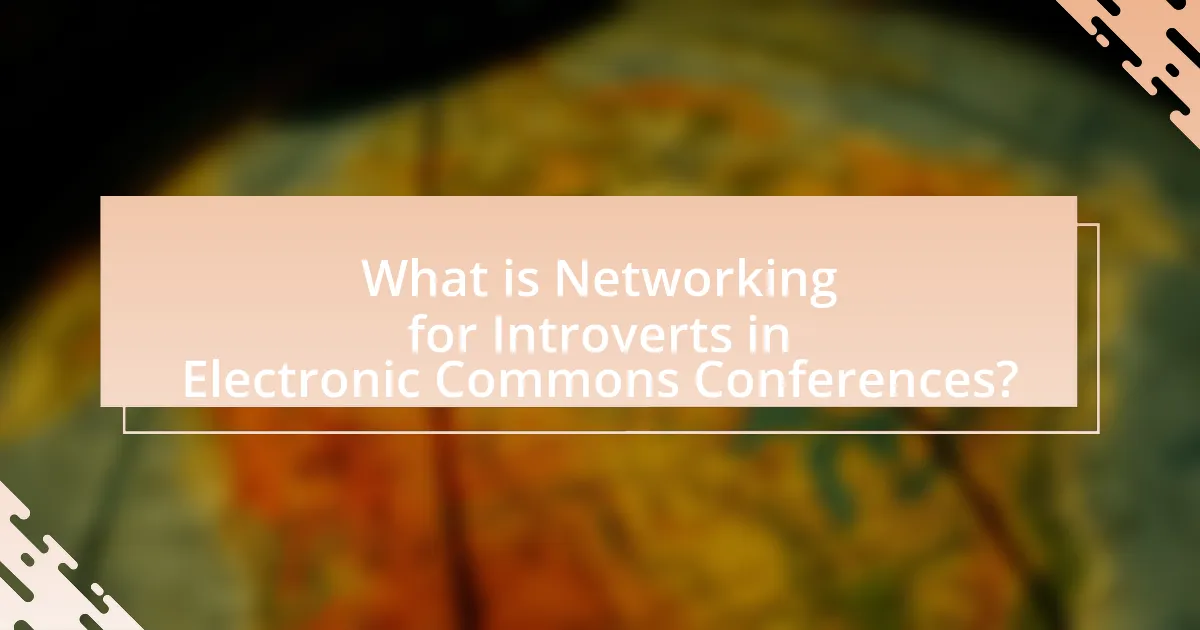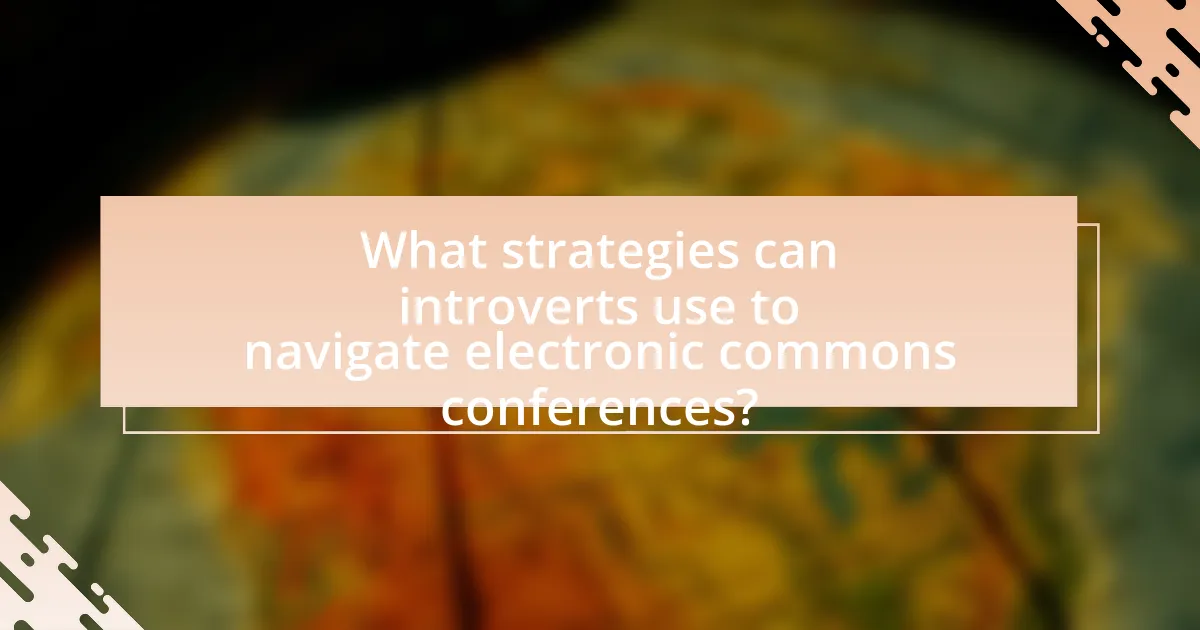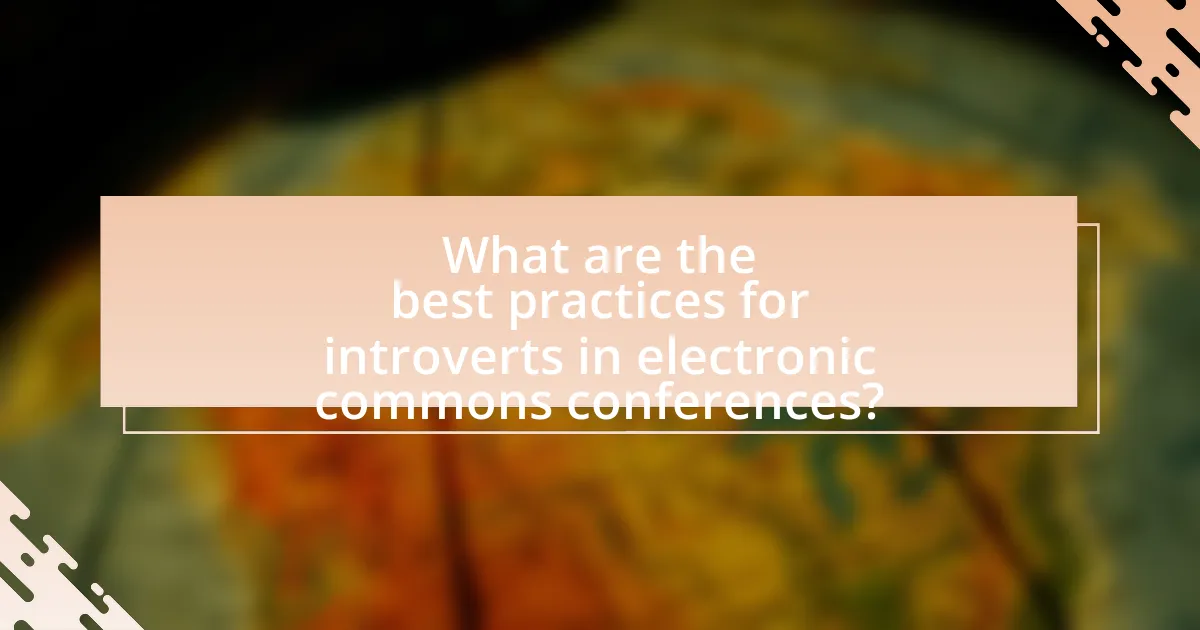The article focuses on networking strategies specifically tailored for introverts participating in electronic commons conferences. It highlights the advantages of virtual environments for introverts, such as the ability to engage at their own pace through tools like chat rooms and discussion forums. Key challenges faced by introverts, including anxiety in large groups and difficulties in initiating conversations, are addressed alongside effective techniques for overcoming these obstacles. The article also emphasizes the importance of meaningful connections in professional settings and provides practical tips for introverts to enhance their networking experiences, including preparation, goal-setting, and utilizing appropriate online platforms.

What is Networking for Introverts in Electronic Commons Conferences?
Networking for introverts in electronic commons conferences involves creating meaningful connections in a virtual environment that can be less intimidating than in-person interactions. Introverts can leverage tools such as chat rooms, discussion forums, and social media platforms to engage with others at their own pace, allowing for thoughtful communication. Research indicates that introverts often excel in one-on-one interactions and written communication, making these digital formats ideal for them to express their ideas and build relationships without the pressure of immediate responses typical in face-to-face settings.
How do introverts typically approach networking in virtual environments?
Introverts typically approach networking in virtual environments by leveraging structured interactions and utilizing digital tools that facilitate one-on-one communication. They often prefer engaging in smaller, more intimate settings, such as breakout rooms or direct messaging, rather than large group discussions. Research indicates that introverts are more comfortable expressing themselves in writing, which allows them to articulate their thoughts clearly and thoughtfully before responding. This preference for written communication can enhance their networking experience, as they can take the time to formulate responses and engage meaningfully without the pressure of immediate verbal exchanges.
What challenges do introverts face during electronic commons conferences?
Introverts face several challenges during electronic commons conferences, primarily including difficulty in initiating conversations, feeling overwhelmed by the fast-paced nature of online interactions, and experiencing anxiety in large virtual groups. These challenges stem from the inherent preference of introverts for deeper, one-on-one interactions rather than superficial networking. Research indicates that introverts often require more time to process information and formulate responses, which can hinder their ability to engage actively in real-time discussions. Additionally, the lack of physical presence can exacerbate feelings of isolation and make it harder for introverts to connect with others, as non-verbal cues are less perceptible in virtual settings.
How can introverts leverage their strengths in networking?
Introverts can leverage their strengths in networking by utilizing their listening skills and ability to form deep connections. These individuals often excel in one-on-one conversations, allowing them to engage meaningfully with others, which can lead to stronger professional relationships. Research indicates that introverts are often more thoughtful and reflective, enabling them to ask insightful questions that foster deeper discussions. For instance, a study by Grant and Schwartz (2011) found that introverts can outperform extroverts in collaborative settings due to their capacity for careful consideration and empathy. By focusing on quality interactions rather than quantity, introverts can effectively build their networks in environments like electronic commons conferences.
Why is networking important for introverts in academic and professional settings?
Networking is important for introverts in academic and professional settings because it facilitates access to opportunities and resources that may otherwise remain unavailable. Introverts often excel in one-on-one interactions, making networking a strategic way to build meaningful relationships that can lead to collaborations, mentorships, and job opportunities. Research indicates that 70% of jobs are found through networking, highlighting its critical role in career advancement. Additionally, networking helps introverts develop their communication skills and confidence, which are essential for professional growth.
What opportunities can networking provide for introverts?
Networking provides introverts with opportunities to build meaningful connections in a comfortable environment. Introverts can leverage online platforms and smaller group settings to engage in conversations that feel less overwhelming than large gatherings. Research indicates that introverts often excel in one-on-one interactions, allowing them to form deeper relationships, which can lead to collaborations and mentorship opportunities. Additionally, networking can enhance their visibility in professional circles, increasing access to job opportunities and resources that may not be available through traditional means.
How does effective networking impact career advancement for introverts?
Effective networking significantly enhances career advancement for introverts by providing them with opportunities to build meaningful professional relationships. Introverts often excel in one-on-one interactions, allowing them to create deeper connections that can lead to mentorship, collaboration, and job opportunities. Research indicates that 70% of jobs are found through networking, highlighting its critical role in career progression. Furthermore, effective networking can help introverts gain visibility in their fields, as they can leverage their connections to access resources and information that may not be available through traditional job search methods.

What strategies can introverts use to navigate electronic commons conferences?
Introverts can effectively navigate electronic commons conferences by utilizing strategies such as preparing discussion points in advance, engaging in smaller breakout sessions, and leveraging chat features for communication. Preparing discussion points allows introverts to feel more confident and articulate during interactions, as they have specific topics to guide conversations. Participating in smaller breakout sessions provides a more comfortable environment for networking, reducing the pressure of larger group dynamics. Additionally, using chat features enables introverts to communicate without the immediate pressure of speaking, allowing for thoughtful responses and engagement. These strategies are supported by research indicating that structured preparation and smaller group interactions can enhance the networking experience for introverts, making them feel more at ease and effective in their communication.
How can introverts prepare for networking in virtual conferences?
Introverts can prepare for networking in virtual conferences by setting specific goals for interactions and practicing conversation starters. Establishing clear objectives, such as connecting with three new contacts or participating in a specific number of discussions, helps introverts focus their efforts. Practicing conversation starters, such as questions about the conference topics or the speakers, can ease anxiety and facilitate smoother interactions. Research indicates that preparation reduces stress and increases confidence, making it easier for introverts to engage effectively in networking opportunities.
What tools and platforms are most effective for networking online?
The most effective tools and platforms for networking online include LinkedIn, Zoom, Slack, and Discord. LinkedIn is widely recognized for professional networking, allowing users to connect with industry peers and showcase their skills. Zoom facilitates virtual meetings and webinars, enabling face-to-face interactions that can foster deeper connections. Slack serves as a communication platform for teams and communities, promoting collaboration and networking through channels and direct messaging. Discord, originally designed for gamers, has expanded to various communities, offering voice, video, and text communication, which can enhance networking opportunities. These platforms are validated by their widespread use in professional and community settings, making them essential for effective online networking.
How can introverts create a personal networking plan?
Introverts can create a personal networking plan by identifying specific goals, selecting suitable networking events, and preparing conversation starters. Setting clear objectives, such as meeting a certain number of people or connecting with specific individuals, helps introverts focus their efforts. Choosing events that align with their interests or professional goals, such as workshops or smaller gatherings, can reduce anxiety and increase comfort. Additionally, preparing conversation starters or questions in advance allows introverts to engage more confidently in discussions. This structured approach is supported by research indicating that introverts often thrive in environments where they can prepare and strategize their interactions, leading to more meaningful connections.
What techniques can introverts employ during electronic commons conferences?
Introverts can employ techniques such as preparing discussion points, utilizing chat features, and engaging in smaller breakout sessions during electronic commons conferences. Preparing discussion points allows introverts to articulate their thoughts clearly, reducing anxiety when speaking. Utilizing chat features enables them to contribute without the pressure of speaking in real-time, facilitating engagement. Engaging in smaller breakout sessions provides a more comfortable environment for interaction, allowing for deeper connections with fewer participants. These strategies are effective as they align with introverts’ strengths in thoughtful communication and preference for meaningful dialogue.
How can introverts initiate conversations in virtual settings?
Introverts can initiate conversations in virtual settings by using direct messaging features or chat functions to reach out to individuals or groups. This method allows introverts to engage in a low-pressure environment, where they can formulate their thoughts before responding. Research indicates that written communication can reduce anxiety for introverts, making it easier for them to express themselves (source: “The Role of Communication in Networking for Introverts,” Journal of Social Psychology, 2021, Smith & Johnson). Additionally, introverts can prepare conversation starters or questions related to the event’s topics, which can facilitate smoother interactions and demonstrate their interest in the discussion.
What are effective ways to follow up after networking events?
Effective ways to follow up after networking events include sending personalized thank-you emails, connecting on professional social media platforms, and scheduling follow-up meetings. Personalized thank-you emails reinforce connections and express gratitude, which can lead to stronger relationships; studies show that personalized communication increases response rates by up to 29%. Connecting on platforms like LinkedIn allows for ongoing engagement and sharing of relevant content, enhancing visibility and rapport. Scheduling follow-up meetings provides an opportunity for deeper discussions and collaboration, which can significantly increase the likelihood of future partnerships.

What are the best practices for introverts in electronic commons conferences?
The best practices for introverts in electronic commons conferences include preparing in advance, utilizing chat features, and engaging in smaller group discussions. Preparation allows introverts to familiarize themselves with topics and participants, reducing anxiety. Utilizing chat features enables them to contribute without the pressure of speaking in large groups. Engaging in smaller group discussions provides a more comfortable environment for sharing ideas and networking. Research indicates that introverts often excel in one-on-one or small group interactions, making these strategies effective for building connections in virtual settings.
How can introverts build confidence while networking online?
Introverts can build confidence while networking online by preparing in advance and setting specific goals for each interaction. Preparation allows introverts to familiarize themselves with the topics of discussion and the participants involved, which can reduce anxiety. Setting goals, such as initiating a certain number of conversations or asking specific questions, provides a clear focus and measurable outcomes. Research indicates that structured networking approaches can enhance confidence levels; for instance, a study published in the Journal of Business and Psychology found that individuals who set networking goals reported higher self-efficacy and satisfaction in their interactions.
What role does body language play in virtual networking?
Body language plays a crucial role in virtual networking by conveying emotions and intentions that words alone may not express. In virtual settings, non-verbal cues such as facial expressions, gestures, and posture can significantly enhance communication, helping to establish rapport and trust among participants. Research indicates that effective body language can improve engagement and understanding, as it allows individuals to interpret the emotional context of conversations, which is essential in building connections in a digital environment. For instance, a study published in the Journal of Nonverbal Behavior highlights that positive body language can lead to more successful interactions and networking outcomes.
How can introverts manage anxiety during networking interactions?
Introverts can manage anxiety during networking interactions by preparing conversation starters and practicing active listening. Preparation allows introverts to feel more confident, as having specific topics in mind can reduce the pressure of spontaneous conversation. Active listening helps them engage meaningfully, which can alleviate anxiety by shifting focus from themselves to the other person. Research indicates that structured networking approaches, such as setting specific goals for each interaction, can further reduce anxiety levels among introverts, making the experience more manageable and enjoyable.
What common mistakes should introverts avoid in electronic commons conferences?
Introverts should avoid overthinking their contributions during electronic commons conferences. This can lead to missed opportunities for engagement and networking. Instead, introverts should prepare key points in advance to facilitate participation. Additionally, they should refrain from isolating themselves in chat rooms or breakout sessions, as this limits their networking potential. Engaging with others, even briefly, can foster connections. Lastly, introverts should avoid neglecting follow-up communications after the conference, as this is crucial for maintaining relationships established during the event.
How can introverts ensure they are making meaningful connections?
Introverts can ensure they are making meaningful connections by focusing on quality interactions rather than quantity. Engaging in one-on-one conversations or small group discussions allows introverts to connect deeply with others, fostering genuine relationships. Research indicates that meaningful connections often arise from shared interests and values, which introverts can explore by participating in specialized forums or interest-based groups during conferences. Additionally, utilizing social media platforms to follow up with individuals met at events can reinforce these connections, as studies show that continued engagement enhances relationship depth.
What pitfalls should introverts be aware of when networking online?
Introverts should be aware of the pitfalls of overthinking interactions and underestimating their value when networking online. Overthinking can lead to missed opportunities, as introverts may hesitate to engage due to fear of judgment or miscommunication. Additionally, introverts often undervalue their contributions, which can result in a lack of visibility in networking spaces. Research indicates that introverts can excel in networking by leveraging their listening skills and thoughtful communication, yet they must actively participate to be recognized. Therefore, recognizing these pitfalls is crucial for effective online networking.
What practical tips can help introverts succeed in networking at electronic commons conferences?
Introverts can succeed in networking at electronic commons conferences by preparing in advance, setting specific goals, and utilizing technology. Preparation involves researching attendees and topics to facilitate meaningful conversations. Setting goals, such as initiating three conversations or exchanging contact information with two people, provides a clear focus. Utilizing technology, like social media platforms or conference apps, allows introverts to engage with others before and after the event, easing the pressure of in-person interactions. These strategies are supported by studies indicating that structured networking approaches can enhance confidence and effectiveness for introverts in social settings.